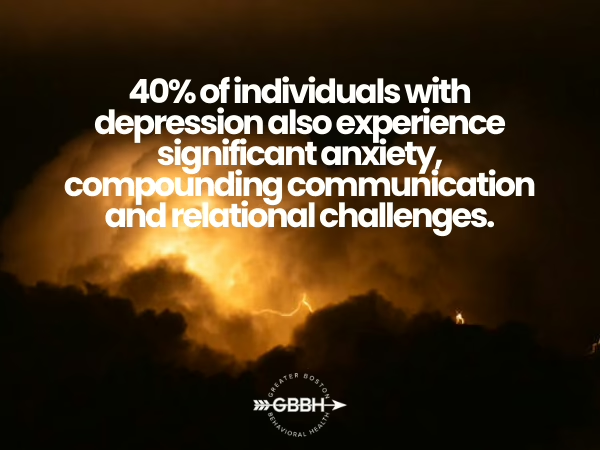Depression is a common mental health disorder that affects millions of people each year, yet its impact often extends far beyond the individual. Relationships with family members, friends, and romantic partners can become strained when depression interferes with open, healthy communication. For those experiencing depression, maintaining meaningful connections can feel overwhelming or even impossible, leading to frustration, misunderstandings, and isolation.
At Greater Boston Behavioral Health, we understand how deeply depression can affect relationships. Through our evidence-based Depression Treatment Programs, we help individuals and their loved ones navigate the challenges of depression and improve communication for stronger, more fulfilling connections. This blog explores how depression inhibits communication and provides actionable solutions to address these challenges.
The Impact of Depression on Communication
Depression affects how individuals think, feel, and behave. These changes often manifest in communication, making it difficult for those with depression to express themselves or connect meaningfully with others.
Key Ways Depression Affects Communication:
- Difficulty Expressing Emotions:
- Depression can dull emotional responses, making it hard to articulate feelings. Individuals may feel detached or unable to convey what they are experiencing.
- Withdrawing from Others:
- People with depression often isolate themselves due to feelings of hopelessness, shame, or exhaustion. This withdrawal can leave loved ones feeling shut out.
- Negative Thought Patterns:
- Cognitive distortions like self-criticism or catastrophizing can lead to misunderstandings or conflict. For example, someone with depression may assume others don’t care about them, even when this isn’t true.
- Low Energy and Motivation:
- Depression saps energy and motivation, making everyday interactions feel like insurmountable tasks.
- Increased Irritability:
- Irritability is a lesser-known symptom of depression that can lead to miscommunication or tension in relationships.
The Ripple Effect of Depression on Relationships
When depression inhibits communication, it affects not only the individual but also their loved ones. Misunderstandings can arise when feelings go unspoken or misinterpreted, creating a cycle of frustration and disconnection.
How Depression Impacts Relationships:
- Romantic Relationships:
Depression can lead to emotional distance or misunderstandings between partners. One partner may feel unsupported, while the other struggles to explain their needs. - Family Relationships:
Family members may misinterpret depression symptoms as laziness, disinterest, or even rejection, leading to hurt feelings and strained dynamics. - Friendships:
Friends may feel confused or rejected when someone with depression cancels plans or avoids social activities.
Addressing depression through professional support is critical to breaking this cycle and fostering healthier communication.
The Role of Therapy in Improving Communication
Therapy offers a safe, supportive space for individuals with depression and their loved ones to explore their emotions, develop communication skills, and rebuild connections. At Greater Boston Behavioral Health, we offer a variety of therapeutic approaches tailored to each client’s needs.
CBT Therapy for Communication
Cognitive Behavioral Therapy (CBT) helps individuals identify and challenge negative thought patterns that inhibit communication. By reframing these thoughts, clients can develop healthier perspectives and improve interactions.
Example:
A client might learn to replace a thought like, “No one cares about me,” with, “I feel disconnected right now, but my loved ones want to help.” This shift fosters openness and reduces feelings of isolation.
DBT Therapy for Emotional Regulation
Dialectical Behavior Therapy (DBT) equips clients with skills to regulate emotions and communicate effectively. DBT focuses on mindfulness, interpersonal effectiveness, and distress tolerance, which are especially helpful for improving relationships.
Key DBT Skills for Communication:
- DEAR MAN: A framework for expressing needs clearly and respectfully.
- Mindfulness: Staying present in conversations without letting negative emotions take over.
- Radical Acceptance: Letting go of frustration about things outside your control to focus on constructive actions.
How Family and Couples Therapy Can Help
When depression affects communication, involving loved ones in the healing process can be transformative. At GBBH, we integrate Family Therapy Programs and Couples Counseling into our Mental Health Therapy Programs to help clients rebuild trust and understanding.
Benefits of Family and Couples Therapy:
- Improved Understanding:
- Loved ones gain insight into how depression affects communication, fostering empathy and patience.
- Conflict Resolution Skills:
- Therapy provides tools for resolving misunderstandings and repairing strained relationships.
- Supportive Environment:
- A neutral space allows everyone to express their feelings and needs without fear of judgment.
Example:
A couple struggling with emotional distance due to depression might use therapy to practice active listening and validate each other’s feelings, reducing tension and rebuilding intimacy.
Practical Tips for Better Communication During Depression
While professional therapy is essential, there are steps individuals and their loved ones can take to improve communication outside of sessions.
For Individuals with Depression:
- Practice Self-Compassion:
Recognize that it’s okay to struggle and ask for help. - Use “I” Statements:
Express feelings without blaming others (e.g., “I feel overwhelmed,” instead of “You don’t support me”). - Set Small Goals:
Aim for manageable interactions, like responding to a text or attending a brief social outing.
For Loved Ones:
- Listen Without Judging:
Create a safe space for the individual to share their feelings without fear of criticism. - Avoid “Fixing” Statements:
Offer support rather than solutions (e.g., “I’m here for you,” instead of “Just think positively”). - Educate Yourself:
Learn about depression to better understand its impact on communication and relationships.
How Greater Boston Behavioral Health Can Help
At Greater Boston Behavioral Health, we provide comprehensive care for individuals struggling with depression and its impact on relationships. Our Mental Health Treatment Center in Boston offers a variety of evidence-based approaches tailored to meet each client’s unique needs.
Our Programs Include:
- Depression Treatment Programs: Focused on addressing the root causes of depression and its symptoms.
- Anxiety Treatment Programs: Helping clients manage co-occurring conditions like anxiety that exacerbate communication challenges.
- DBT and CBT Therapy: Equipping clients with tools for emotional regulation and healthy communication.
- Family and Couples Therapy: Strengthening connections and fostering understanding among loved ones.
Why Choose Greater Boston Behavioral Health?
As a leader in Boston behavioral health, we are committed to providing compassionate, evidence-based care that addresses both individual and relational needs.
What Sets Us Apart:
- Experienced Clinicians: Our therapists specialize in DBT, CBT, and relationship-focused therapies.
- Comprehensive Approach: We address both mental health and relational challenges in a holistic manner.
- Supportive Environment: Our center provides a safe, judgment-free space for healing and growth.
Take the First Step Toward Healing and Connection
Depression doesn’t have to define your relationships. With the right tools and support, you can overcome communication challenges and build stronger, healthier connections. At Greater Boston Behavioral Health, we’re here to help you every step of the way.
Contact us today at (888)278-0716 to learn more about our Depression Treatment Programs, DBT Therapy, and other services. Together, we’ll help you create a brighter future for yourself and your relationships.
FAQ About Depression Inhibits Communication in Relationships
How does depression affect communication?
Depression can inhibit communication by causing emotional withdrawal, difficulty expressing feelings, irritability, and negative thought patterns, which can lead to misunderstandings and strained relationships.
Can depression impact romantic relationships?
Yes, depression often creates emotional distance and communication barriers in romantic relationships, leading to feelings of isolation or frustration for both partners.
How does therapy help improve communication in relationships affected by depression?
Therapies like DBT and CBT help individuals develop emotional regulation, mindfulness, and interpersonal effectiveness skills, fostering healthier communication and stronger connections.
Is family therapy helpful for addressing communication issues caused by depression?
Absolutely. Family therapy provides a safe space for loved ones to understand how depression impacts communication and to work on rebuilding trust and connection.
Does Greater Boston Behavioral Health offer therapy for relationship challenges related to depression?
Yes, we provide Depression Treatment Programs, Family Therapy Programs, and evidence-based approaches like DBT Therapy and CBT Therapy to support both individuals and their relationships.


